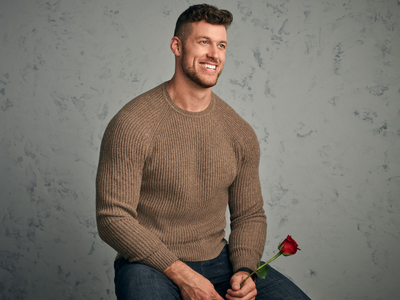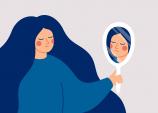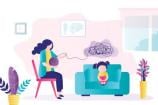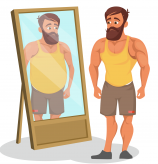Finding My Own Silver Linings Playbook Through Mental Health Advocacy
 I’m 6-feet 5-inches, 260 pounds, a former NFL athlete, and starred as a lead on ABC TV’s The Bachelor, Season 26. It’s hard not to notice me when I walk into a room but when I do these days, it’s often to tell people that I recently struggled with depression and anxiety and as early as 7th grade, I suffered from body dysmorphia. I didn’t know the term or what it meant until I was in college, but I knew I hated the way I looked way before that. In middle school, I would pinch my stomach or sides every morning in front of the mirror, then hundreds of times throughout the day, hyper-focusing on what I thought was a flaw, a defect, seeing myself as fat and gross. That would start my day off on a bad note.
I’m 6-feet 5-inches, 260 pounds, a former NFL athlete, and starred as a lead on ABC TV’s The Bachelor, Season 26. It’s hard not to notice me when I walk into a room but when I do these days, it’s often to tell people that I recently struggled with depression and anxiety and as early as 7th grade, I suffered from body dysmorphia. I didn’t know the term or what it meant until I was in college, but I knew I hated the way I looked way before that. In middle school, I would pinch my stomach or sides every morning in front of the mirror, then hundreds of times throughout the day, hyper-focusing on what I thought was a flaw, a defect, seeing myself as fat and gross. That would start my day off on a bad note.
In college I packed a lot of weight for football and when my teammates found out about my body dysmorphia, they called me Bad Body Ech. It hurt but I laughed it off. On bus rides to games, going over a bump, I was constantly aware of my fat jiggling. The incessant thinking about my body just added up and added up and I couldn’t push it out of my mind. It tore me down. Putting a name to the condition helped but it would still be a few years before I started to seek treatment. When I began challenging the narrative around men with body dysmorphia to open up the conversation, I knew I was getting better and could try to help others. It’s not something men easily talk about, to say the least.
When I reach even one person, like I did one night at a dinner when a guy came over to me and told me how he never felt comfortable telling anyone about his body dysmorphia but my being so open about it left him feeling less alone, I know that I am on the right path. Despite the unfortunate outcome on The Bachelor, I have been fortunate. My actions on the show resulted in hate mail saying I was a horrible person and telling me to kill myself, and left me feeling depressed, defeated, and ashamed. But I was eventually able to take my negative experiences and turn them into something positive.
 I have learned that mental health contributes to how we define ourselves as individuals. We all deal with it in some shape or form, and we need to not only recognize it but take it a step further. For me, exercise, nutrition, getting more information and knowing the facts helped. Even seeing my body-fat percentage as a number made me realize I was in a healthy range. I got to a place where I acknowledged my feelings and was okay with them, whether good or bad, and stopped beating myself up. I adopted a mind-frame where I asked myself, what can I do today – in this moment – to improve upon myself so that I am a little better than I was yesterday, or the day before. And I realized the steps I was taking to initiate change on my own. But I also got professional help and support.
I have learned that mental health contributes to how we define ourselves as individuals. We all deal with it in some shape or form, and we need to not only recognize it but take it a step further. For me, exercise, nutrition, getting more information and knowing the facts helped. Even seeing my body-fat percentage as a number made me realize I was in a healthy range. I got to a place where I acknowledged my feelings and was okay with them, whether good or bad, and stopped beating myself up. I adopted a mind-frame where I asked myself, what can I do today – in this moment – to improve upon myself so that I am a little better than I was yesterday, or the day before. And I realized the steps I was taking to initiate change on my own. But I also got professional help and support.
When I tell people on my speaking tours that I went to therapy, I want them to see that my story is one of self-reflection and honesty. The experience was nothing like I thought it would be. It was a channel for me to release, to get the pain out there in a safe and nonjudgmental space. I found myself voicing issues but at the same time voicing solutions. The therapist asked questions and helped guide the conversation, but I came to a lot of the realizations myself and I added this person, this experience, to my support system. The power of therapy is that you can start to identify issues before they become problems. It helps you put things to rest so that they don’t pile up because the pile-on effect is what ultimately leads you to feeling hopeless and taking destructive measures.
Speaking candidly across the country, whether at schools, organizations, or other forums, I am hoping to help destigmatize the issues around body dysmorphia and other mental health conditions. Particularly for young men and boys where there is still a lot of stigma and shame around speaking out. Men don’t have the same type of support or resources and they’re less inclined to talk about it, feeding into that toxic masculinity. We need good male role models and if I can be that to one person, two people or even a whole network, then it’s worth it. I still pinch my sides 50 times a day – it’s a habit now – but I am so much more self-aware, and I give myself grace and acceptance.
Through the platform I have now, I am sharing my battle scars to make an impact. I admit that the ability to tour and speak out more easily comes from the success and attention (good or bad) I got from the show but now, I want to use the spotlight to advocate for mental health awareness and treatment, so others don’t have to go through what I did. Something good came out of the sensational editing of my experience on The Bachelor and now it’s time for me to edit my own story.
Share Your Story and Voice and Help #breakthestigma Around Mental Health
Support ADAA's Mission - Every Gift Makes an Impact



















